For more information, see the most detailed article here!
1 Black Peppercorns Benefits
Black peppercorns are the fruits of a vine plant with long stems and glossy leaves similar to betel leaves but longer. Peppercorns grow in clusters, are green when fresh, and turn red, yellow, or orange when ripe. After harvest and sun-drying, they become dark brown or black with a wrinkled skin. Black peppercorns are typically sold whole or cracked, while white peppercorns are the result of removing the outer layer of the black peppercorn, revealing a milder flavor.
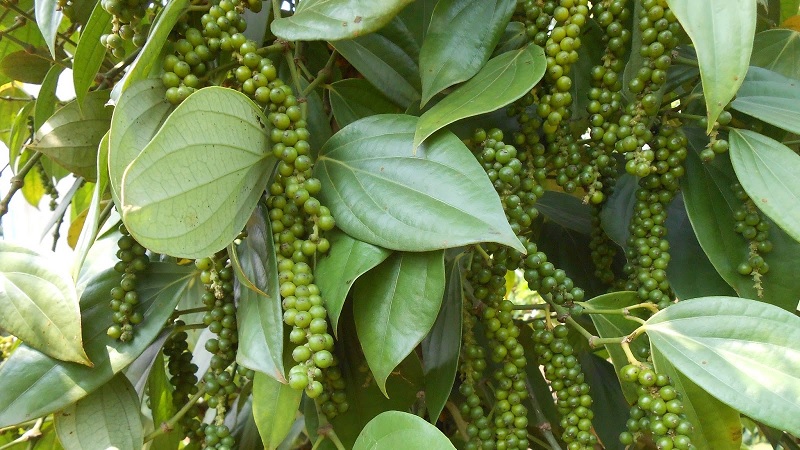
Black pepper is a popular spice used in cooking to enhance flavor and stimulate appetite. It aids in digestion and has medicinal properties, treating various ailments such as:
- Stomach aches, indigestion, diarrhea, abdominal discomfort, and dyspepsia.
- Gastric ulcers
- Abdominal pain and diarrhea
- Asthma, bronchitis, and heart palpitations
- Prevents muscle cramps effectively
- Treats colds, coughs, headaches, and fevers
- Bronchitis and other respiratory issues
- Joint pain, neuralgia, and skin diseases like scabies.
Additionally, discover effective, simple, and natural home remedies that you should know.
2 Precautions When Using Black Pepper
While black pepper offers numerous health benefits, it may cause adverse reactions in some individuals, including:

Eye irritation: Black pepper can cause eye swelling and discomfort if it comes into contact with the eyes.
Allergies: Some people may experience allergic reactions such as itching, hives, or other skin irritations due to the components of black pepper.
Hot and spicy nature: Black pepper has a heating nature, which may cause symptoms like internal heat, acne, rapid heartbeat, nervousness, or discomfort in individuals sensitive to spicy foods.
Children’s safety: Large doses of black pepper may cause respiratory distress in children, so it is crucial to consult a pediatrician before including it in their diet.
These adverse effects are not universal, and if any of these symptoms occur, discontinue use and seek medical advice immediately.
3 Comparing Black and White Peppercorns
Processing Methods:
Black peppercorns are harvested when the berries are fully mature but still green or with a hint of yellow in the cluster. Sun-drying causes the outer layer to shrink and turn dark, resulting in the familiar black peppercorn.
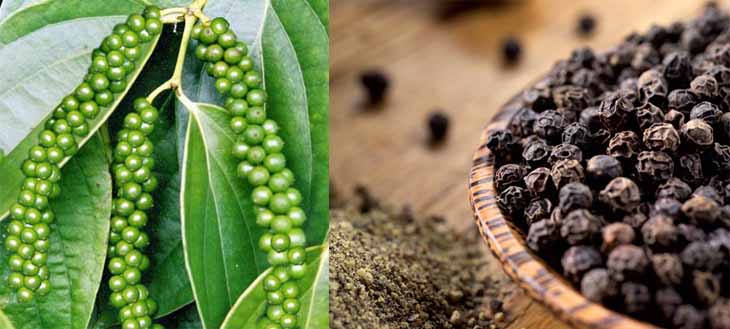
White peppercorns are produced by harvesting the berries when they are fully ripe and red. They are then soaked in water to soften the outer layer, which is subsequently rubbed off to reveal the white inner seed. Sun-drying completes the process, resulting in white or cream-colored peppercorns with a smooth or slightly wrinkled surface.
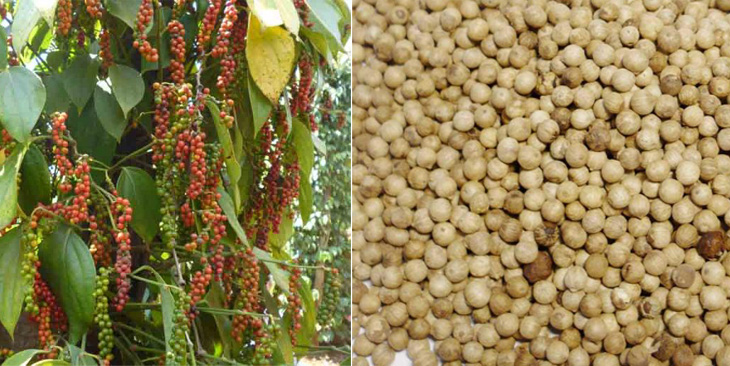
Visually, white peppercorns are more aesthetically pleasing than their black counterparts.
Aroma:
Despite their wrinkled appearance and modest color, black peppercorns possess a distinctive aroma that enhances the flavor of dishes.
White peppercorns, on the other hand, lose some of their aromatic qualities during the soaking and de-husking process, resulting in a slightly pungent smell associated with fermentation.
Spiciness:
Black peppercorns are milder in spiciness compared to white peppercorns. The heat builds gradually after consumption.
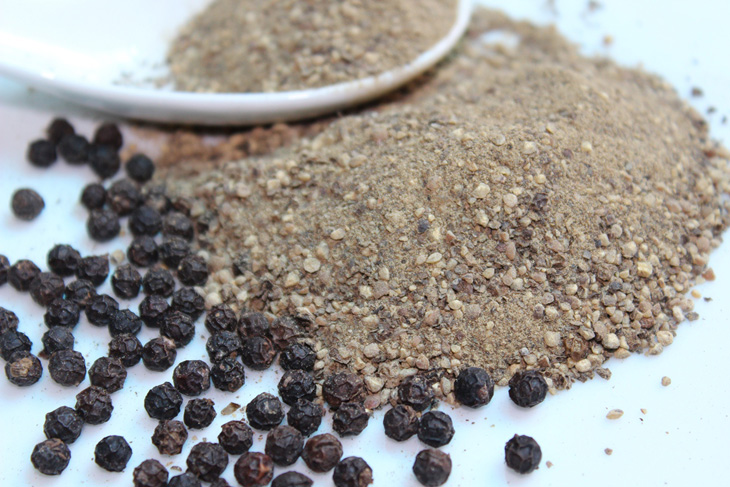
White peppercorns deliver an immediate punch of spiciness due to their riper state and the presence of the seed.
Shelf Life:
Black peppercorns, dried in the sun at high temperatures, have a longer shelf life and are less susceptible to external factors.
The intricate processing of white peppercorns shortens their shelf life. Prolonged storage may result in bitterness and a loss of their distinctive flavor.
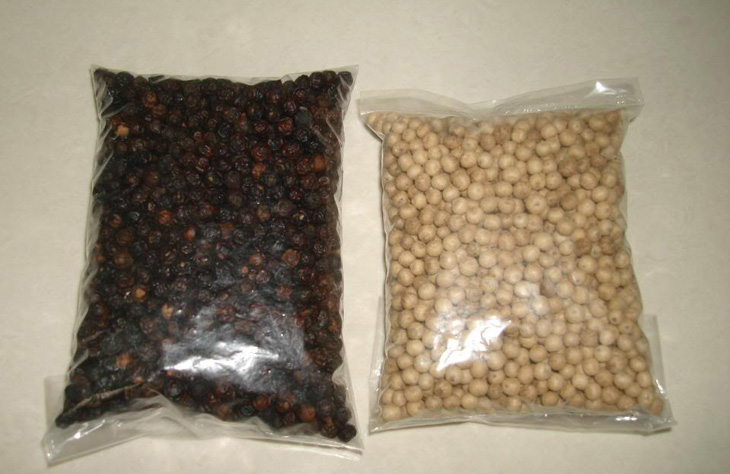
Health Benefits:
Black peppercorns, with their intact outer layer, are nutrient-rich and offer a range of health benefits. They are used to treat coughs, colds, and flu, aid digestion, stimulate appetite, promote weight loss, prevent cancer (breast and intestinal), enhance skin beauty, and combat dandruff, among other things.
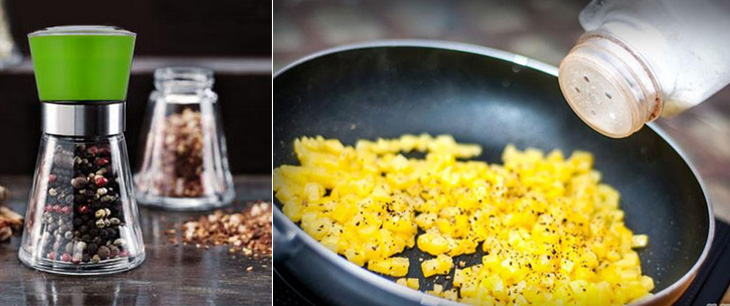
White peppercorns have fewer health benefits and are primarily used as a flavoring agent in cooking to add aroma and spiciness to dishes, particularly in European cuisine, where they complement cream-based dishes.
4 Black or White Peppercorns: Which Is Better?
The choice between black and white peppercorns ultimately depends on personal preference. White peppercorns offer a more intense spiciness that hits the palate immediately, whereas black peppercorns provide a gradual build-up of heat and a more distinctive aroma.
In terms of health benefits, black peppercorns are the clear winner, offering a wide range of medicinal properties. They are highly regarded by culinary connoisseurs and those with a sophisticated palate for their superior flavor and quality.
Additionally, ensuring the safety and authenticity of white peppercorns can be challenging, as their processing may involve chemical treatments that are harmful to health.
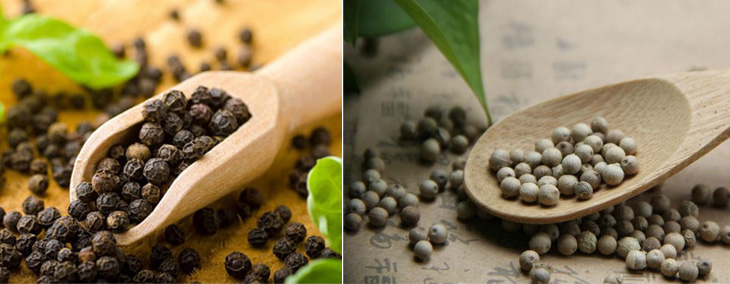
Both black and white peppercorns are beloved spices, and the decision between the two often boils down to personal taste. However, when it comes to versatility and health benefits, black peppercorns take the crown.
Explore 12 Amazing Destinations for Biking Trips
Unlock Vietnam in a brand new way with an exciting biking tour! Discover the stunning beauty of the country with Dien May XANH’s top 12 must-see destinations. From sweeping plains to clear blue beaches and mountainous vistas – experience all the sights with your own personal cycling tour. Find your ideal route and set out for an adventure today!





































